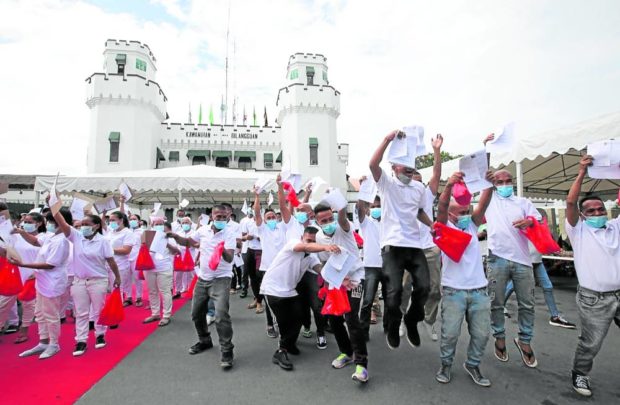357 inmates released after service of sentence, parole

HELLO AGAIN, WORLD | Ex-convicts jubilate as they step out of New Bilibid Prison after being released. (AVITO DALAN/PNA)
MANILA, Philippines — A total of 357 inmates in prison facilities of the Bureau of Corrections (BuCor) were released on Wednesday, a month after freeing almost 400 others.
“Our goal is to release all those who are not supposed to be in prison. We will do this to the best of our abilities,” Justice Secretary Jesus Crispin Remulla said at a ceremony at New Bilibid Prison (NBP) in Muntinlupa City for the release of the 357 inmates.
Of the total, 235 inmates, or more than half, were released due to the expiration of their sentence and the remaining 122 had their paroles granted.
Those who walked away from BuCor facilities on Wednesday were handed their certificate of discharge, hygiene kits, and transportation allowance enough for them to return to their homes.
Remulla said he would focus on the release of qualified inmates every month in a bid to decongest prisons.
Based on BuCor figures, most of the inmates released came from the Davao Prison and Penal Farm (PPF) at 136, followed by inmates from NBP at 102.
But other inmates were also released from other BuCor facilities: Iwahig PPF in Puerto Princesa City (49); Leyte Regional Prison (28); Correctional Institution for Women in Mandaluyong City (22); and Sablayan PPF in Occidental Mindoro (20).
318 other cases pending
The release coincided with the celebration of the 28th National Correctional Consciousness Week, an annual event during the last week of October under Proclamation No. 551 signed by then-President Fidel Ramos in 1995.
In his message, Remulla again pushed for regionalized prison facilities to address the many problems of BuCor.
“It is important to regionalize the prison system because the Philippines is an archipelago. Many inmates here are no longer visited by their families because they are far from them,” he said.
According to Remulla, there were 318 inmates with pending parole and clemency requests before the Office of the President who could be released before the end of the year.
The Department of Justice in September submitted to Malacañang more than 300 names for executive clemency, which is traditionally done during the Christmas season.
Executive clemency could range from absolute to conditional pardon with or without parole conditions, as well as reprieve or deferment of implementation of the sentence and commutation of the sentence.
The president is authorized by the Constitution to commute sentences or to grant a pardon, as in other countries.